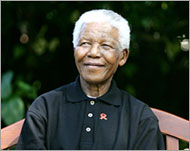Mandela praises apartheid-era leader
Nelson Mandela has paid tribute to PW Botha, the former South African president, who resisted international calls to release him from prison.

Botha, who led South Africa at the height of the anti-apartheid struggle, died at the age of 90 at his home on the southern Cape coast on Tuesday.
Nelson Mandela in a statement on Wednesday said: “While to many Mr Botha will remain a symbol of apartheid, we also remember him for the steps he took to pave the way towards the eventual peacefully negotiated settlement in our country.”
Botha’s death should be a reminder of “how South Africans from all persuasions ultimately came together to save our country from self-destruction”, he said.
His statement reflected the core policy of reconciliation that underpinned his own presidency and which many believe saved South Africa from a bloody transition from apartheid.
Multi-racial country
Botha spent his final years in seclusion from the changes taking place in the new multi-racial South Africa at his home in the village of Wilderness.
Captain Frikkie Lucas said: “Botha died at home, peacefully.”
Botha led the country through its worst racial violence and deepest international isolation.
Known for his finger-wagging, confrontational style and nicknamed the “Old Crocodile” for his feared temper, Botha served as head of the white government from 1978 to 1989.
‘Unpleasant bully’
Mandela was eventually freed by Botha’s successor, FW de Klerk, in 1990.
 |
|
Botha refused to release |
De Klerk in his autobiography described Botha as an unpleasant bully who frittered away opportunities to improve South Africa’s toxic racial politics.
But on Tuesday, Botha’s successor expressed regret at the passing of a man often associated with the last stand of South Africa’s white hardliners, sending deep condolences to his relatives.
Although he said his relationship with Botha was “often strained” he also acknowledged that it was under Botha’s leadership that the government first made contact with Mandela and African National Congress leaders in exile.
“In 1986, the National Party under his guidance finally abandoned its policy of separate development,” De Klerk said.
“PW Botha was a strong leader and an effective organiser. I would like to honour Botha for the enormous contribution that he made to preparing the way to the new South Africa,” he said in a statement.
Anarchy
Botha saw South Africa spiral into anarchy as he kept a tough line against what he called the “total onslaught” of communism and its partners in Africa’s black liberation movements.
His fall from grace in the National Party, led by the French and Dutch-descended Afrikaners who dominated South Africa for decades, mirrored the collapse of apartheid.
After De Klerk replaced him in 1989, he repudiated almost everything the hardliner had stood for, including the laws at the heart of the system of strict racial segregation.
De Klerk guided South Africa’s white rulers through the delicate negotiations that ultimately brought the African National Congress (ANC), led by Nelson Mandela, to power in multi-racial elections in 1994.
Nobel Prize
De Klerk and Mandela shared a Nobel Peace prize for their efforts to create a new, non-racial South Africa that stood in stark opposition to Botha’s vision for the country, while Botha spent his final decades politically isolated, but unrepentant.
|
“Take me to court if you want to charge me! I will not appear in circuses!” PW Botha, |
Although his security forces killed more than 2,000 people and an estimated 25,000 others were detained without trial and often tortured, he refused to apologise for apartheid and denied he had known about the torture and assassinations.
“Take me to court if you want to charge me! I will not appear in circuses!” he told reporters after being subpoenaed to testify to the state-appointed Truth and Reconciliation Commission, which blamed him for much of the horror of the last decade of white rule in its final report in 2003.
Quiet life
Since leaving office, Botha had lived a quiet life with his second wife Barbara, occasionally emerging to launch broadsides at the ANC and defend white rule.
Asked in a television interview what would have happened if the black majority took control in 1948 – when Botha’s National Party took power – he remained unwavering.
“I think by this time we would have been in the drain already,” he said.
The ANC, which under Thabo Mbeki continues to lead the country, issued a brief statement on his death.
“The ANC wishes his family strength and comfort at this difficult time,” the party said.
Botha is survived by his wife and his two sons and three daughters from his first marriage.